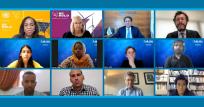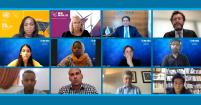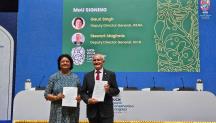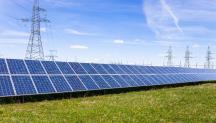

Energy Transition Heroes Address Equity and Climate Challenges
Newsletter
“It is the responsibility of our generation to ensure that young people are actively engaged in our challenges,” said IRENA Director-General Francesco La Camera, addressing young people from around the world at the first webinar in a new series of IRENA Youth Talks titled “Energy Transition Heroes”.
“You’ve been fearless in standing up to what is right and each one of you is a hero and a pioneer,” he added. “To build a new energy system, we need you.”
In collaboration with Enel Foundation, IRENA launched the series to empower young people by offering a platform to share ideas, be heard and learn from experts in various fields related to the energy transition.
“We believe that a just energy transition revolving around electricity as the main vector is the most powerful solution to achieve climate and sustainable goals and tackle several inequalities” said Michele Crisostomo, Chair of Enel and Chair of the Scientific Committee of Enel Foundation. “It’s key that we provide the younger generation with opportunities to understand the chances and the challenges of the energy transition and take active part in its future development, so to promote intergenerational collaboration and new ideas.”
Mr. Crisostomo identified the three main elements of such transition: power generation from renewables, electrification of end-uses and enabling transmission through ever more resilient, digital and flexible grids.
The pilot session, moderated by Akshay Jamdade, Founder of Green Sustainable Future, focused on addressing equity and climate challenges through renewables-based energy transitions. While the environmental advantages of renewable energy are widely understood, the numerous socio-economic benefits have only become apparent recently as the deployment of renewable energy technologies advances.
Among the most critical energy issues that continue to hinder sustainable development towards a just and inclusive world is a persistent energy access gap. According to the recently launched SDG7 Tracking Report, more than 750 million people worldwide still lack access to electricity.
Delivering her remarks, Ms. Damilola Ogunbiyi, CEO and Special Representative of the UN Secretary-General for Sustainable Energy for All and Co-Chair of UN-Energy, highlighted renewable energy as a key solution to the energy access issue, stressing the need for a nuanced approach that considers regional differences in infrastructure, national policies, access to finance and technical capabilities.
“We know what must be done,” said Mr. Jeffrey Sachs, President of the Sustainable Development Solutions Network, speaking on the need to achieve universal energy access and net zero emissions by 2050. “The question is: how do we get there?”
Mr. Sachs’s question was not a rhetorical one; he urged young participants to develop practical solutions to the challenges facing the energy transition and asked them to chart a path towards carbon neutrality for their cities and countries, underscoring the unique passion and forward-facing mindset that young people possess as key for change.
The event also featured a debate between young leaders including Jin Tanaka from Japan, representing the SDG 7 Youth Constituency; Lyndsay Walsh, Climate and Energy Policy Assistant at the WWF in Belgium; Nisreen Elsaim, Chair at the UN Secretary-General’s Youth Advisory Group on Climate Change; and Riva Tulpule, Founder at WecareDXB and Y4S Sustainability Ambassador Alumni.
During her intervention, Nisreen Elsaim gave strong firsthand examples of the devastating impacts of climate change from her country Sudan, citing temperatures as high as 50 degrees Celsius. She also recently witnessed one of the worst floods in the country in over 100 years. Nisreen’s message was clear: the world needs to act now and developing nations that are already suffering from the impacts of climate change, despite their minimal contribution to carbon emissions, are in dire need of help to adapt.
Lyndsay Walsh, however, has expressed hope and optimism. “The opportunities that a future based on renewables offers are really exciting if done correctly,” she said. “The energy transition should leave no one behind as we transition to a sustainable society, and it should seek to eliminate existing inequalities.” She also emphasised that, “the transition should be shaped through inclusive social dialogue as we’re doing today.”




